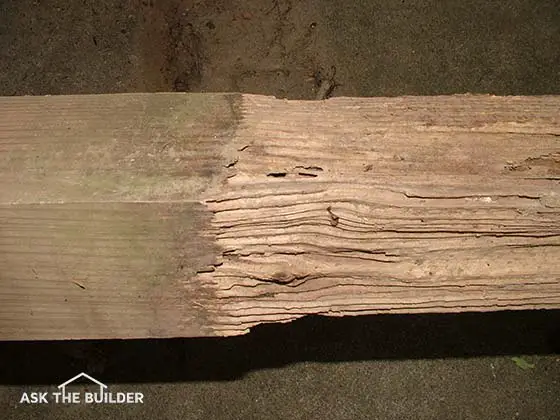Winged Insects – Termites

Lookie lookie, Can you see the extensive termite damage on the right side of the post? Imagine my reaction when I pulled this post out of the ground. ©2017 Tim Carter
DEAR TIM: Yesterday morning I noticed a large amount of insect wings on my garage floor. A neighbor said this might be a sign of termites. Is this so? My house was chemically treated for these pests about 7 years ago. Should I be concerned? If I have to retreat, what options are available? Molly, Kinston, NC
DEAR MOLLY: Uh Oh... I've got good news and bad news. The good news is that there are going to be multiple births in your near future. The bad news is that it is going to cost you a lot of money. The insect wings are very likely signs of termite infestation. The wings were left behind by reproductive termites that emerged from an existing, nearby colony. These pests are now in the process of forming a new colony, quite possibly within your garage.
You should be very concerned about this problem. Nationwide, termites chew up over $1 billion worth of lumber and cellulose products each year. The sinister creatures even invade steel framed office buildings. Once there they forage on the paper backing of drywall! Imagine how your delicious spruce and fir 2x4s and 2x10 floor joists are going to taste.
There are over 40 species of termites in the USA alone. They are very well organized. Each colony has a king and a queen. The queen rules supreme for long periods of time. Queens have been known to lay as many as 80,000 eggs in one day in an effort to further the species. Since some termite queens can live up to 70 years of age, they can be responsible for creating millions of new termites.
The rest of the colony is made up of the reproductive termites, soldiers, and workers. Soldier termites defend the colony. The reproductives are future kings and queens waiting around for the debutante ball. The worker termites are the ones you need to be concerned with. These devils are the only ones that leave the nest on a daily basis. The workers are responsible for providing food (your wood) for all of the inhabitants of the colony. This fact is the Achilles heel of the termite circle of life.
The worker termites forage for food 24 hours a day, 7 days a week. They are constantly looking around for new sources of food. They normally eat at 4 - 5 locations during the week. They may eat the wood in your home on a Monday and eat some dead tree roots next to your house on a Wednesday. They fill their stomachs and then proceed back to the colony to regurgitate the food for the other termites. To eliminate termites from your home, you must eliminate the entire colony. This can only be achieved by killing the worker termites.
Termite infestation? Pick the best exterminator using my Termite and Carpenter Ant Checklist. I offer a 100% Money Back Guarantee.
Traditional chemical treatments, like the one performed at your house, simply create a barrier for foraging termites. If the chemicals break down in the soil or fail to create a complete barrier, the termites can invade your house again.
There are two alternatives in the war against termites. Several chemical companies have developed systems that attract foraging termites. Unobtrusive bait stations are planted in strategic locations in the soil around your home. The pest control specialists check them periodically for infestation. Once termites find the bait, the pest control people insert special chemicals into the bait stations. The workers eat the poisoned food and eventually begin to die off. Deprived of their food delivery source, the remaining termites in the colony soon die.
Pest control companies can also apply borate chemicals to the lumber in your home. This can be done in both new construction and existing homes. The boron in these chemicals kills the workers slowly. The other termites within the colony are poisoned as well by the boron tainted carry out food. Borates, however, are somewhat water soluble. Rain can wash them from the soil or any wood exposed to water. Borates are an excellent way to supplement the use of traditional chemicals or the newer chemical bait systems.
Author's Notes :
September - 1999
I recently received a letter from the public relations firm that represents the Bayer Corporation. One of the head scientists at this company was kind enough to review all of my past information on termites and offered some suggestions in order to keep my content as accurate as possible.
This individual, Dr. Byron Reid, said that up until his company developed a new product called Premise, my statements about liquid chemicals not killing termite colonies was accurate. The Bayer Corporation folks maintain that their product will kill foraging worker termites immediately but does not harm pets or humans. I would ask about this system when you speak with professional exterminators. Remember, a barrier chemical treatment system is only as good as the person who is injecting the chemicals into the ground. TC